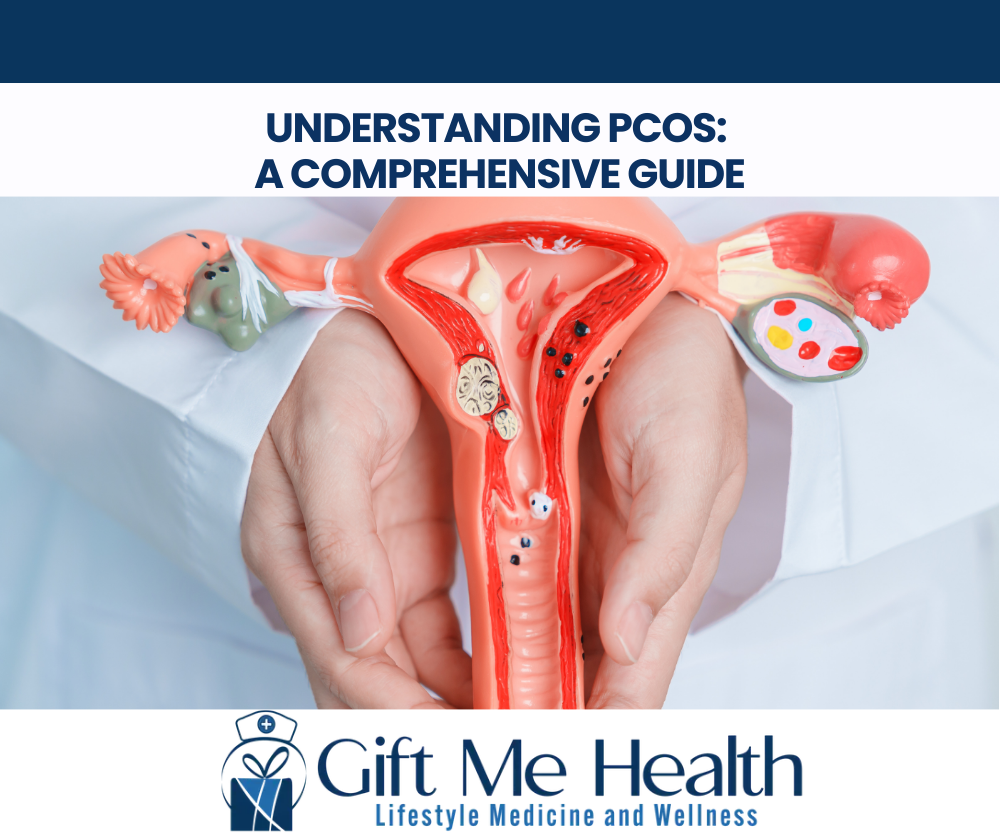 Polycystic Ovary Syndrome (PCOS) is a common hormonal disorder that affects many women of reproductive age. This condition can have a profound impact on various aspects of health and wellness.
Polycystic Ovary Syndrome (PCOS) is a common hormonal disorder that affects many women of reproductive age. This condition can have a profound impact on various aspects of health and wellness.
At Gift Me Health Lifestyle Medicine and Wellness, we believe in empowering our patients with knowledge and support to manage and overcome the challenges associated with PCOS.
What is PCOS?
PCOS, or Polycystic Ovary Syndrome, is a hormonal imbalance that affects the ovaries. It is characterized by the presence of multiple small cysts on the ovaries, irregular menstrual cycles, and elevated levels of male hormones (androgens). PCOS can lead to a range of symptoms and health complications if not properly managed.
Common Symptoms of PCOS
- Irregular Periods: Infrequent, irregular, or prolonged menstrual cycles.
- Excess Androgen Levels: Increased facial and body hair, severe acne, and male-pattern baldness.
- Polycystic Ovaries: Enlarged ovaries that contain numerous small cysts.
- Weight Gain: Difficulty losing weight and obesity.
- Infertility: Challenges with ovulation, making it difficult to conceive.
- Skin Issues: Darkening of the skin, particularly in the neck creases, groin, and underneath breasts.
Causes of PCOS
The exact cause of PCOS is unknown, but several factors may contribute to its development:
- Genetics: PCOS often runs in families, suggesting a genetic link.
- Insulin Resistance: Many women with PCOS have insulin resistance, leading to higher insulin levels, which can increase androgen production.
- Inflammation: Low-grade inflammation can stimulate polycystic ovaries to produce androgens.
- Hormonal Imbalance: Imbalances in hormones such as insulin, androgens, and progesterone.
Managing PCOS at Gift Me Health Lifestyle Medicine and Wellness
Our approach to managing PCOS focuses on a comprehensive and personalized plan that includes:
- Lifestyle Modifications: A balanced diet, regular exercise, and weight management are crucial in managing PCOS symptoms. We provide tailored nutrition and fitness plans to help our patients achieve and maintain a healthy weight.
- Medical Treatment: Medications may be prescribed to regulate menstrual cycles, reduce androgen levels, and manage insulin resistance.
- Hormonal Therapy: Birth control pills or other hormonal therapies can help regulate periods and reduce symptoms like acne and excessive hair growth.
- Fertility Treatment: For women struggling with infertility, we offer various fertility treatments to enhance ovulation and increase the chances of conception.
- Emotional Support: Living with PCOS can be challenging, and we provide emotional and psychological support to help our patients cope with the condition.
Comprehensive Q&A Section
Q1: What are the long-term health risks associated with PCOS?
A1: Women with PCOS are at a higher risk for developing several long-term health issues, including type 2 diabetes, high blood pressure, heart disease, sleep apnea, and endometrial cancer. Regular monitoring and proactive management are essential to reduce these risks.
Q2: Can PCOS be cured?
A2: There is no cure for PCOS, but its symptoms can be effectively managed through lifestyle changes, medication, and other treatments. Many women with PCOS lead healthy and fulfilling lives with proper management.
Q3: Is it possible to get pregnant with PCOS?
A3: Yes, many women with PCOS can conceive with the right treatment and lifestyle changes. Fertility treatments such as ovulation induction, medications, and assisted reproductive technologies (ART) can improve the chances of pregnancy.
Q4: How does diet impact PCOS?
A4: Diet plays a significant role in managing PCOS. A diet rich in whole foods, low in refined sugars and processed foods, and balanced in macronutrients can help manage weight, reduce insulin resistance, and alleviate symptoms.
Q5: What types of exercise are beneficial for women with PCOS?
A5: Both aerobic exercises (such as walking, running, and swimming) and resistance training (such as weightlifting) are beneficial for women with PCOS. Regular physical activity helps improve insulin sensitivity, support weight management, and reduce stress levels.
Q6: Can PCOS affect mental health?
A6: Yes, women with PCOS are more likely to experience mental health issues such as depression, anxiety, and low self-esteem. It is essential to address these concerns with appropriate support and treatment.
Q7: What role does insulin resistance play in PCOS?
A7: Insulin resistance is a common feature of PCOS and contributes to higher insulin levels in the body. This can lead to increased androgen production, worsening symptoms such as irregular periods and excessive hair growth.
Q8: Are there any natural remedies for managing PCOS?
A8: While natural remedies alone may not cure PCOS, they can complement medical treatments. Herbal supplements, acupuncture, and stress-reduction techniques like yoga and meditation may help alleviate symptoms. Always consult with a healthcare provider before starting any natural remedies.
Conclusion
Living with PCOS can be challenging, but with the right knowledge, support, and treatment, women can manage their symptoms and lead healthy, fulfilling lives. At Gift Me Health Lifestyle Medicine and Wellness, we are dedicated to helping our patients navigate their PCOS journey with compassion and expertise. Our team is here to provide comprehensive care, from lifestyle modifications to medical treatments and emotional support.
If you have any questions or need further assistance, please reach out to our team at Gift Me Health Lifestyle Medicine and Wellness. Together, we can work towards better health and wellness, empowering you to take control of your PCOS and live your best life.




